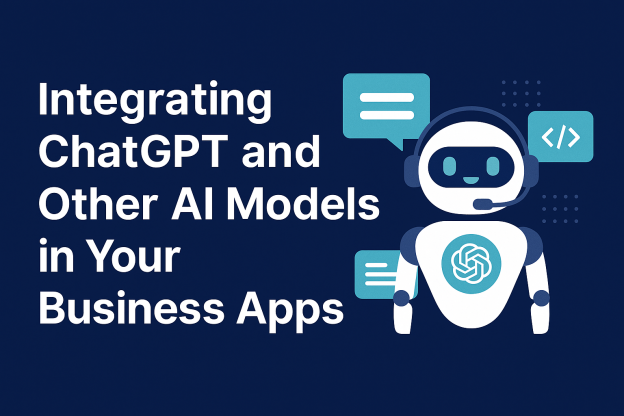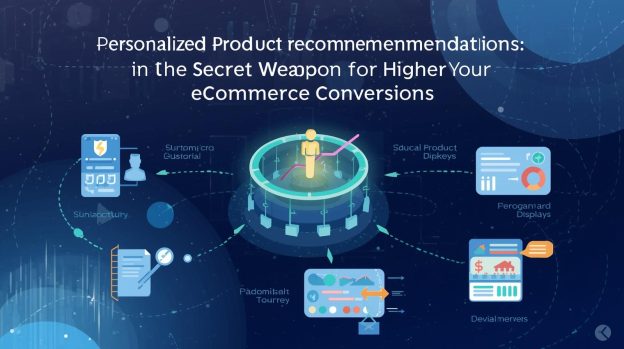Integrating ChatGPT and Other AI Models in Your Business Apps

We are hearing a lot about Artificial Intelligence (i.e., AI), but you know the technology came to India during the 1960s. Ever since, there have been discussions about how AI will transform industries like IT, education, and healthcare, among others. But it is now in 2025 that we witness Artificial Intelligence technology taking the world by storm, by entering into every sector. Interestingly, the technological shift in AI use comes at a time of changing customer preferences.
One good thing about the technological revolution brought to India is that businesses are becoming smart, and they try to understand what their customers want. For example, earlier, the business owners operated from their physical stores with a limited set of audience. Later on, they started doing business through websites and applications that could reach a wider audience.
Today, in 2025, customers have several options to choose from; hence, it’s important that businesses learn about the changing preferences and customer demands. Let’s explore how you can enhance user interaction and make your business operations more seamless by integrating ChatGPT into your mobile applications, websites and web applications. We will focus on both the “Why” and “How” aspects of ChatGPT integration in this article.
What is ChatGPT?
You can look at ChatGPT as a program that is capable of performing various tasks like conversing in human-like language, summarising text, creating content, understanding instructions, debugging code, writing essays, and correcting grammar, among others.
ChatGPT is a Large Language Model by OpenAI, an AI research company based in San Francisco. The most recent and popular use of ChatGPT is its integration into web apps, mobile applications and websites. As per statistics provided by Backlinko, there are more than 400 million active weekly users of ChatGPT worldwide.
Yes, you are guessing it right, it is indeed a very big number in a very short period. With millions of users preferring ChatGPT to converse, learn insightful recommendations, and read summaries, it has made an entrance into the world of e-commerce as well. The OpenAI CEO recently revealed that around 800 million people use ChatGPT, out of which 8.19% of the total traffic comes from India. However, in another article by the Times of India, experts highlight that India is on top in terms of ChatGPT usage. There are a total of 13.5% of monthly active users in India, leaving the U.S. behind.
(Source: DigitalSilk)
Now, without getting into the good and bad use of ChatGPT, let’s first quickly understand what ChatGPT will do for your business needs if integrated smartly.
The most prominent use of AI LLMs like ChatGPT in mobile apps and websites is to enable smart conversations with customers. On a broader scale, there are many AI models similar to ChatGPT, which can transform your existing apps and websites, improving their performance and user-friendliness. These AI models are Imagen AI, Co-Pilot, Gemini, etc. Let’s dive into it.
How will ChatGPT Transform Your Business App for Customers?
As said before, ChatGPT performs text generation, which helps in communicating with customers on a human level, but through a program. A small business may not have the feasibility of an additional customer support agent available 24/7. Instead, businesses can now integrate ChatGPT within mobile apps and websites to understand the problems faced by customers. They can provide necessary solutions like enhanced customer support and improved query resolution to customers efficiently.
Even in the case of larger businesses, AI models like ChatGPT simplify business operations by acting as virtual assistants to your customers, while actual assistants couldn’t. Learn why you need ChatGPT for your business app/website.
Content Generation
In 2025, there are examples of many businesses in small, mid and large sizes that have integrated ChatGPT and other AI applications like Siri, Alexa and Google Assistant. For instance, Expedia, a travel technology company based in America, has integrated ChatGPT into their mobile app interface, according to a Forbes report published in 2023. It helps customers to chat with the AI travel agent and plan their whole trip according to availability, timings and destinations. They can skip searching for hotels, flights and cabs and instead, make a list of hotels with their distance and price to make an informed decision.
You can train the ChatGPT model and fine-tune it with new data according to your business records and data. Doing this will enable ChatGPT to create engaging and creative ad copies, write emails and customise content based on the relevant business data fed into the model. Know that ChatGPT works on a large amount of data, and the responses given to users by the model are a result of the knowledge put into it.
Lead Generation and Workflow Management
In the above example, it is clear that ChatGPT works with content creation, speech recognition, translation and summarisation. In addition to that, ChatGPT helps in the overall workflow management of your business. It helps in task management, email management and sales assistance. For instance, you can automate alerts with the help of ChatGPT, like sending emails, creating an event in a calendar, etc.
In addition to that, you should integrate ChatGPT into your website and existing mobile app to generate potential leads. You will not have to worry about missing customer queries/messages anymore, as you can enable real-time human-like responses through AI. You can use ChatGPT to engage with customers and gather information to convert them into potential leads.
Insights and Analytics
ChatGPT, when integrated with websites and mobile apps, retrieves data from various sources, from social media, spreadsheets, and databases. It gathers insights on what customers are saying about your business. The AI model helps you analyse customer behaviour, market trends and changing customer behaviour so that you can make necessary improvements in the business model. The AI model proactively provides recommendations as well to help you improve the services and overall customer experience.
Product Recommendations and Customisation
The ChatGPT model provides product recommendations to customers based on their preferences. In addition to that, there are other AI models like Imagen that are widely adopted by e-commerce businesses in India. Other AI models are recognised widely for their personalisation and customisation services.
For instance, the adoption of the latest Imagen model is done by “Bewakoof”, a clothing brand in India (the parent company of Bewakoof is Aditya Birla Fashion and Retail). This AI model allows customers to personalise the t-shirts by designing them according to their preferences and style. The Imagen AI model in Bewakoof’s interface allows customers to take control of the design decisions. It provides seamless design customisations in selected t-shirts by adding different colour variations and recommending styles.
Technical Ways to Integrate ChatGPT into Mobile App
Have you understood why you need AI models like ChatGPT in your existing website or mobile app? ChatGPT brings personalisation and analytical advantages both for your business and for your customers.
Customers would love a website that offers them smart insights, personalised recommendations and decision-making support. In addition to that, you can leverage AI models to bring efficiency to your operations and gain productivity. Let’s see how ChatGPT integration is possible in your business apps –
1. API Integration
If you are not a developer, know that API integration is something technical. The first and easiest way to integrate ChatGPT into a website or mobile app is through the API. An API is a program which works with existing applications, websites and software. The combination of ChatGPT API with application code eliminates the need to develop the LLM from scratch.
The benefit of this approach is that it requires minimal technical proficiency and resources. The small businesses with limited data requirements can use the ChatGPT API within their app without too much investment. But, on the other hand, its limitation is such that it will not allow fine-tuning the AI model based on your business data and requirements.
2. Builder Platform for Chatbots
The first thing for you to know is that it’s something technical. There are chatbot builder platforms available widely, which developers use to create a chatbot, including integration with ChatGPT. There are pre-built tools available on builder platforms which give ease of accessibility and extended support to develop the chatbot. These platforms are Tars. Landbot, etc.
The benefit of using a builder platform to develop a chatbot and integrate with ChatGPT is that such platforms come with a fixed pricing plan. As a business owner, you can choose which subscription model or pricing plan works best for you. However, the customisations are pre-built on the platform itself, and as a developer, you will have to go out of your way to set up new design and bot functionality.
3. Custom LLM Implementation
The third option is the most versatile one, but it works best if you have a large business enterprise. The combination of the above two methods gives a custom chatbot in which the integration of ChatGPT is possible. The developers at Vervelogic in Jaipur have the experience of creating a custom AI chatbot that learns the language of your experts and converses with customers accordingly.
The custom LLM implementation is a complex process requiring versatile and experienced developers. The developers will build the chatbot from scratch and then integrate an AI model (i.e., ChatGPT) to meet your business needs. The custom implementation is highly effective for businesses, as the functionality of the chatbot depends on what you want. The developers create the chatbot functionality, design the conversation flow, front-end interface and a robust back-end to interface with ChatGPT. It benefits in the long term when you get to customise the features or the LLM model itself according to the business requirements.
Are you ready to adopt an intelligent way of doing business to optimise your operations and engage customers in a meaningful way? Book a consultation today with experts at Vervelogic, a mobile development company in India, to learn more about AI integration in websites and mobile apps.
FAQs
Can we integrate ChatGPT into pre-existing applications?
Yes, absolutely. OpenAI provides an API which can be used directly within the project, be it a software, mobile application, web application, or website.
How can I integrate the ChatGPT API directly into the code?
The integration of the ChatGPT API is done into the code by first accessing the API, setting up API keys, and implementing relevant API calls in the code.
Is ChatGPT free to be integrated into the website/app?
Yes, OpenAI provides the ChatGPT API for free, but it comes with a limited number of queries. For production applications, however, the API access is paid, which depends on tokens.
Is it worth paying for ChatGPT integration in mobile apps?
Yes. ChatGPT is worth it if your website or application requires automation, high-quality responses to customers, and robust customer support.




